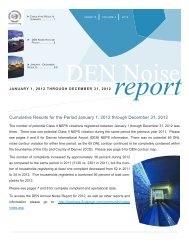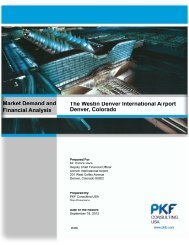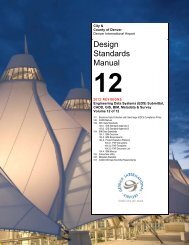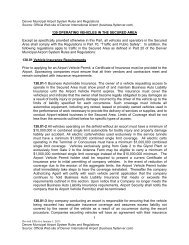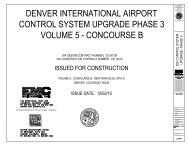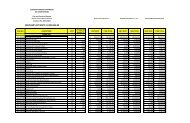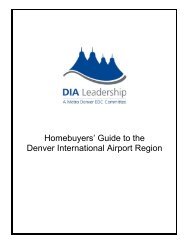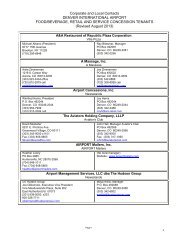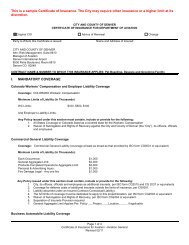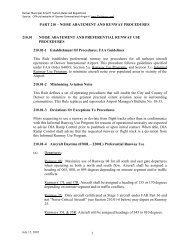Prevailing Wage/Certified Payroll Overview - DIA Business Center ...
Prevailing Wage/Certified Payroll Overview - DIA Business Center ...
Prevailing Wage/Certified Payroll Overview - DIA Business Center ...
Create successful ePaper yourself
Turn your PDF publications into a flip-book with our unique Google optimized e-Paper software.
AuditorCity and County of DenverAuditor’s Office / <strong>Prevailing</strong> <strong>Wage</strong>201 West Colfax Ave., Dept. 705 Denver, Colorado 80202Phone 720‐913‐5000 FAX 720‐913‐5035www.denvergov.org/auditor<strong>Prevailing</strong> <strong>Wage</strong>/<strong>Certified</strong> <strong>Payroll</strong> <strong>Overview</strong>What is the basis for <strong>Prevailing</strong> <strong>Wage</strong>?It's the Law: <strong>Prevailing</strong> <strong>Wage</strong> is covered under Section 20‐76 of the Revised Municipal Code of the City and County ofDenver.The law declares that any contractor or subcontractor at any tier who performs construction, alteration,improvements, repairs, maintenance or demolition of any public building or work in the amount of $2,000 ormore, must pay their employees working on those city projects nothing less than the appropriate rate asdetermined by the Career Service Board for the various classifications of workers employed on those cityprojects by those contractors or subcontractors.Work performed in these various classifications at Denver International Airport, Four Mile Park, South WestYMCA, Denver Mountain Parks, and the Denver Zoo to name a few locations is also subject to <strong>Prevailing</strong> <strong>Wage</strong>payment and reporting requirements.Who Determines <strong>Prevailing</strong> <strong>Wage</strong> Rates?Career Service Authority (CSA): CSA issues four groups of wages: Building, Heavy, Highway and CSA rates.Building: covers everything inside the footprint (foundation) of the building.Highway: covers the construction, alteration, or repair of roads, streets, highways, airport apron areas,runways, taxiways, alleys, parking areas, and other similar projects that are not incidental to "building," or"heavy" construction.Heavy: covers everything outside the footprint of the building. It is used for structures that are not habitable.Toll booths, outhouses, kiosks and parking garages are not “buildings”. It is the catch all rate for projects whichare neither “building” nor “highway”.Heavy rates are used for building demolition. Gutting a building for a remodel is done with the Building rates. Acommon laborer may do the demo in a building remodel. If fixtures are to be salvaged and reused in theremodel (retrofitting), the proper classification ‐ for example, plumber ‐ must be used to salvage theequipment.CSA rates are determinations by the Career Service Authority that have been issued for special classificationsnot covered by the U.S. Dept. of Labor. For example, finishers, floor grinders and base grinders use CSA rates,along with specialized trades at <strong>DIA</strong> such as transit mechanics or baggage system technicians. CSA publishescustodian rates which are applicable for those subcontractors cleaning on‐site construction trailers.What Types Of Work Are Covered By <strong>Prevailing</strong> <strong>Wage</strong>?All work performed on site is covered by <strong>Prevailing</strong> <strong>Wage</strong>. Initial site delivery is not covered, nor is material fabricatedoffsite. However, all materials trucked offsite are covered. Truckers who haul breakout offsite and return backto the site are covered round‐trip. Owner‐operators must report hours. Trash roll‐offs are covered.
All materials removed from the common delivery pile belong to the craft installing the product (i.e., lumbercarpenters,pipe‐ plumbers) ‐ NOT common laborers). The initial unloading of material from the truck to thejob site does not fall under <strong>Prevailing</strong> <strong>Wage</strong>. Professional services, such as surveying, engineering, or clericalsupport staff are not covered by <strong>Prevailing</strong> <strong>Wage</strong>.What are <strong>Certified</strong> <strong>Payroll</strong>s?<strong>Certified</strong> <strong>Payroll</strong>s are the payroll reports you will submit on a weekly basis online through www.lcptracker.net. TheLCPtracker system is a paperless, online system of entering certified payrolls. Rather than submitting thefamiliar paper <strong>Prevailing</strong> <strong>Wage</strong> forms (Affidavits of Prime Contractor, Statements of Compliance, Weekly<strong>Payroll</strong> Spreadsheets), contractors will enter all payrolls and related information online.All project‐specific wage rates & classifications will be online, and the contractor will choose specific rates andjobs from a menu. The contractor will need a computer and an internet connection. For those contractorswho do not have this ability, the prime contractor of each project will provide the computer and equipmentnecessary to submit the payrolls electronically. (Public computers are available at most public libraries, and theCity & County of Denver has computers available in the Small <strong>Business</strong> Opportunity office on the first floor ofthe Wellington Webb Municipal Building).This paperless submittal change is not optional; all companies will be using the new system. Thosecontractors who submit paper payrolls will have them returned, and will enter them into the online system.Training is available through self‐guided online tutorials available when a contractor logs in to the system:www.lcptracker.net Click on the e‐training link near the top of the page. For an overview of the LCPtrackersystem, please go to www.lcptracker.com.When a contractor is awarded a City & County of Denver project, the <strong>Prevailing</strong> <strong>Wage</strong> investigator assigned tothe project will set up the project in the LCPtracker system, and provide the prime contractor with a log‐in andpassword. The prime contractor will then input the various subcontractors, and the system will assign themlog‐ins and passwords.The first two letters of the project name in LCP are the initials of your investigator.If a wage classification is missing for your project, or an apprentice classification is missing, call yourinvestigator and they can quickly add a missing classification to your project.If a project is missing when you log in and you have submitted payrolls previously, call your investigator; theproject may have been closed and they will re‐open the project for you.What about Fringe Benefits?Fringe benefits must be paid for all hours worked on the project and must be approved by the Auditor’s Office.Approval is valid for one year from the date of issue.<strong>Prevailing</strong> <strong>Wage</strong> schedule includes an amount for “rates” and “fringes”. This is the total amount you must paythe employees on an hourly basis. If your company offers fringe benefits, you may submit your fringe benefitto the Auditor’s Office for approval. If the stated fringe amount is $9.00 per hour and we approve the value ofyour fringe as $3.00 per hour, you would need to pay the difference of $6.00 per hour on the employee’scheck. The following are a list of documents that may be needed to approve your fringes.Basic guidelines:The Auditor’s Office is the independent steward of the City’s financial information and resources.10/6/11We are committed to providing quality service and full accountability.Page 2 of 8
Health & Welfare – provide a copy of the company policy regarding: Medical Plan –ooBill / recent invoice from the insurance company and proof of payment from the company that policyis in forceWhat portion does the company pay versus what the employee paysDental – same as aboveLife Insurance – same as aboveLong or Short Term Disability – same as above Pension Plans –oooIRS qualification letterCopy of the plan, including name of third‐party administratorPortion of the contribution paid by the companyVacation – Copy of company policy.Holiday – Copy of company policy.Sick Pay – Copy of company policy.To compute fringes, the Auditor’s Office will provide your company with a Fringe Benefit Spreadsheet to becompleted by your staff. On the spreadsheet, the company needs to provide the following:Hire date of each employeeSocial security numberNumber of paid vacation/holiday hoursEmployee non‐prevailing wage ratePremium the employer paysThe Auditor’s Office uses 2080 hours for annualized benefits and 173 hours for monthly benefits to calculatethe value of fringe benefits.In order for sick, vacation and holiday time to count as a fringe, the company may not have a “use it or lose it”policy.If hours earned do not carry over to the next year the company must pay for the hours not taken.If an employee leaves the employment of the company he/she must be paid his/her accrued time earnedregardless of the reason of the separation.If the employee must work the day before or after a holiday in order to qualify for holiday pay that does notqualify as a benefit.Pensions, 401(k), Simple IRAs or other programs must be funded at least quarterly to count as a fringe benefit.Apprentices are paid full benefits unless program specifically addresses fringe contribution.The Auditor’s Office is the independent steward of the City’s financial information and resources.10/6/11We are committed to providing quality service and full accountability.Page 3 of 8
What about Apprentices?Apprenticeship Certification Requirements: If an employee is listed as an apprentice, include his/her craft andappropriate percent on the payroll. Example: Operating Engineer, Group 3, 80%.Apprentices shall be permitted only if they are employed pursuant to, and individually enrolled in a bonafide apprenticeship program registered with the U.S. Department of Labor. The employer and the individualapprentice must be registered in a program, which has received prior approval by the U. S. Department ofLabor.Any employer found to be in violation of this provision shall be required to pay that apprentice the fulljourneyman scale. Contractors may not use more than a 1 to 1 ratio of journeyman to apprentice.If the apprentice classification is missing from your LCP project, contact your investigator and ask them to addthe classification to the project.Apprentice wages are assigned on an as‐needed per project basis.How Do You Pay Employees?Payment of Employees: By ordinance, all employees working on a City and County of Denver project are required to bepaid on a weekly basis for the hours worked. Only janitorial and window washing contracts with the city areexempt from this requirement. Janitors and window washers must be paid every 14 days.Cash payments are not allowed. If cash payments are made, the contractor will be required to issue a check toeach employee.Salaried employees doing hands‐on work, not just supervising or scheduling, must record their days and hourson the weekly certified payroll reports. Their hourly salary is calculated by dividing their annual gross wage by2,080 hours. If their salary does not equal the <strong>Prevailing</strong> <strong>Wage</strong> for their particular job classification, they mustbe paid an additional amount to make up the difference. Should they accrue overtime on a Denver project byworking more than 40 hours per week, they must be properly compensated for those hours. If their regular,hourly salary exceeds the <strong>Prevailing</strong> <strong>Wage</strong> rate, overtime is calculated on that salary and not a lower rate.How Do We Determine Classification of Employees?Workers are classified according to the work performed in each craft. In other words, like pay for like work.Employees may have their time split into different classifications and be paid accordingly.Daily time cards are recommended, detailing the work performed. We recommend that the workers sign themat the end of each shift. Employees found working out of their classification will have their pay rate adjustedaccordingly.Some Guidelines for Common Laborers:Common laborers may unload truck to a common or central pile. Once the material is in the pile, itbelongs to the particular craft. For example, laborers do not pack studs, sheetrock, pipe, tools or othermaterials to craftsmen. They do not move materials on the job site found to be in the way or in the wronglocation.Common laborers have limited job duties on building projects. They are allowed to clean up an interiorbuilding site. This includes picking up trash, construction debris and sweeping. Common laborers can handshovel and backfill with a shovel the trenches used by tradesman inside of a building foundation.The Auditor’s Office is the independent steward of the City’s financial information and resources.10/6/11We are committed to providing quality service and full accountability.Page 4 of 8
Common laborers are not helpers or apprentices. They do not assist in laying out, fetching tools ormaterial, holding lifting or muscling materials into place. They do not observe workers for safety reasons.They do not set scaffolding. They do not operate heavy equipment (e.g. bobcat, forklift, man lift orloaders).Common laborers may shovel for grade on Heavy projects.The Auditor’s Office makes the final decision on craft classification jurisdiction, following local area practices. If youhave a question regarding how to classify an employee, your investigator welcomes your call.E‐verifyEffective October 1, 2010, the City passed an e‐verify ordinance for all employees hired after Oct. 1, 2010 and workingon a <strong>Prevailing</strong> <strong>Wage</strong> project.You must e‐verify new employees hired before you bring them on a Denver project.When you are setting up a newly hired employee into LCPtracker, you will notice a check‐box that states, “Ihave e‐verified this employee”. You will need to check the e‐verify box in LCP Tracker setup stating that youhave e‐verified the affected employee.The Auditor's Office has the right to verify that the employee brought onto a Denver project has been e‐verified.What if a Contractor performs work personally?Owner Operator Requirements: Use Form 73, Affidavit Contractor Performed Work Personally. The owner mustoperate his or her own equipment and provide documentation to prove sole proprietor status or partnership ofthe business. Firms may provide Trade Name Registration, Articles of Incorporation, or Form 1040 Schedule C.Trucking firms must provide Vehicle Registration and Certificate of Insurance.If owners meet the above requirements, they are exempt from paying themselves <strong>Prevailing</strong> <strong>Wage</strong>s, but theymust submit their hours worked on the project in LCPtracker. However, if they have employees on the project,those employees must be reported and paid <strong>Prevailing</strong> <strong>Wage</strong>s.The Owner Operator form, with appropriate back‐up documentation, must be submitted with the company’sfirst weekly payroll.How Does Overtime work with <strong>Prevailing</strong> <strong>Wage</strong>?Overtime Requirements: Employees have to be paid time and one‐half for all hours worked over 40 hours in a sevendayperiod, whether worked on or off city projects.If overtime is worked on a City project, the overtime rate is based on the published <strong>Prevailing</strong> <strong>Wage</strong> rate, or theestablished hourly rate of pay, whichever is higher.Cash in lieu of fringe is paid for each hour worked, but is not multiplied by the overtime rate of 1.5. If youcombine the cash in lieu of fringe with the base rate and report this amount as the hourly rate of pay, you arerequired to calculate overtime on this established rate of hourly pay.The Auditor’s Office is the independent steward of the City’s financial information and resources.10/6/11We are committed to providing quality service and full accountability.Page 5 of 8
An employee who normally receives a higher rate per hour than the published <strong>Prevailing</strong> <strong>Wage</strong> rate must bepaid their off city rate while working on a city project.What if there is an issue with our certified payrolls?Notification Process: The prime contractor receives a copy of any violation email sent to a subcontractor throughLCPtracker. Phone calls are noted in the project’s hard file, e‐file, or within LCP Tracker. Emails are savedand/or copied into the project file. A prime contractor may ask to be set up as an administrator in LCP and beallowed rights to see payrolls from subs in any project they are assigned to. Ask your investigator to assign youto a specific project and you will be able to review any payrolls submitted on that project.All work performed and billed to Denver for any given project must be reported in LCP Tracker for the periodbeing billed per your pay application.Failure to report work being billed to the City will result in the project’s payment being held until compliance isachieved, as per D.R.M.C. 20‐76.Many times you will be notified that you have notices when you try to certify your payrolls. Some notificationswill prevent you from certifying payrolls. Contractors need to address those notifications.Owner operators will receive up to 4 notifications when they certify their payrolls. There is nothing you can doabout that, it is an LCPtracker issue.PenaltiesEffective May 13, 2010, the City has implemented an ordinance that allows for penalties for not paying youremployee the proper <strong>Prevailing</strong> <strong>Wage</strong>. This includes a number of <strong>Prevailing</strong> <strong>Wage</strong> violations, such asmisclassifying workers, not reporting workers, as well as failure to pay the correct hourly wage.The fines range from:$20 per week per employee for the first offense, to$35 per employee per week for the second offense, and up to$50 per employee per week if the contractor has had 3 or more penalties in the previous three years.The full section of the ordinance may be found at D.R.M.C. 20‐76(e). Penalties will be paid to the city ofDenver. Underpaid wages will still be paid to the worker in addition to these fines.Continual violations of Denver <strong>Prevailing</strong> <strong>Wage</strong> may subject the contractor(s) to debarment from citycontracting due to violations of law, pursuant to D.R.M.C. 20‐77.How does a contractor correct payroll errors and underpayments?When underpayments have occurred, contractors are required to amend payrolls and issue underpayment checks.There are multiple steps to make up an underpayment. After you have been notified there has been anunderpayment, you will need to provide a spreadsheet that lists:1. the employee(s);The Auditor’s Office is the independent steward of the City’s financial information and resources.10/6/11We are committed to providing quality service and full accountability.Page 6 of 8
2. their classifications;3. their hours worked each week;4. what they were paid and what they should have been paid for the classification(s) worked, and;5. the difference owed to each affected employee. This should be broken out by straight time andovertime hours;When the contractor and the investigator have agreed on the underpayment amount, then checks will bemade out as follows:In accordance with City Ordinance 20‐76, Revised Municipal Code, the checks must be made payable to theindividual employee or the City and County of Denver, (i.e., “Joe Smith or City and County of Denver”) andmailed to the Auditor’s Office for placement.One check per employee may be written for multiple weeks of underpayments.The underpayment amounts will be entered into LCPtracker, documenting the amount of theunderpayment, deductions and the new check number.Can <strong>Prevailing</strong> <strong>Wage</strong> rates change on a project?Yes. Increase or decrease in wages: The anniversary date of the contract is one year from the date the Mayor signs thecontract.If you are a subcontractor, your anniversary date for wage changes is not your contract date, but the primecontractor’s date.On special projects, it is a year from the date the contract is signed by the binding parties. Projects goingbeyond the one year anniversary date require all contractors to pay the wages that are in effect on theanniversary date.The <strong>Prevailing</strong> <strong>Wage</strong> investigator provides the new wages to the prime contractor, who is responsible fornotifying all subcontractors of wages in effect on the anniversary date.By Ordinance, any wage increase occurring on that date cannot be passed on to the City.Are there posters to display at the jobsite?Yes. Posting of wages and poster on job site: The <strong>Prevailing</strong> <strong>Wage</strong> poster and all wages applicable to the project willbe posted by the prime contractor in an area on the job site easily accessible to all employees. The poster maybe downloaded at the following site:http://www.denvergov.org/Portals/3/documents/<strong>Prevailing</strong><strong>Wage</strong>PosterForOnsites.pdfCan payments be withheld for the project?Yes. Withholding payment: By ordinance, payment will be withheld if weekly payroll reports are not current for theprime contractor or any subcontractors.Current means no more than 2‐3 weeks out from the current date, or current through the billing dates listed oncurrent pay applications.The Auditor’s Office is the independent steward of the City’s financial information and resources.10/6/11We are committed to providing quality service and full accountability.Page 7 of 8
Payment can also be withheld for the following reasons:Underpayments or misclassification/non‐reporting of employees.Unapproved fringe benefits deduction.Incomplete or missing certified payroll reports.Poster and wage schedules not posted on the job site.To avoid withholdings, prime contractors should consistently review the payroll submissions by all projectsub‐contractors in LCPtracker for timeliness, as well as notices and warnings, helping the sub‐contractors inquestion to resolve them.How does the Auditor's Office ensure <strong>Prevailing</strong> <strong>Wage</strong>?On Site Employee Interviews: Employees are observed working and interviewed by the <strong>Prevailing</strong> <strong>Wage</strong> Investigator.Employees are not interviewed during break or lunchtime.Contractors need to make employees aware that they may be interviewed by an investigator and employeesmust talk to the investigator.The employees’ supervisor should not be present during the interview.What happens when the project is complete?Closeout‐‐ Prime Contractor’s Responsibility: Make sure all payrolls submitted at all levels are current and marked“Final”. There is a check box in LCP that will mark a payroll as final. The check box can be found in thecertification process.When can a contractor submit billings?Billing for Services: Per D.R.M.C. 20‐78, a contractor may not bill for services before the weekly payroll reports aresubmitted for the pay period being billed. Any pay applications or requests for payment on <strong>Prevailing</strong> <strong>Wage</strong>work that has not been reported will be held until submittal of certified payrolls.What is the Prime Contractor responsible for on a <strong>Prevailing</strong> <strong>Wage</strong> project?Submitting all certified payrolls accuratelyEntering all subcontractors into LCP TrackerMaking sure all subcontractors are reporting weekly and correctlyAuditing daily reports from jobsite against payroll reports to ascertain that all subcontractors are filing.Resolving any subcontractor payroll issues promptly so prime contractor pay is not withheld.Providing support to subcontractors in LCP TrackerThe Auditor’s Office is the independent steward of the City’s financial information and resources.10/6/11We are committed to providing quality service and full accountability.Page 8 of 8



